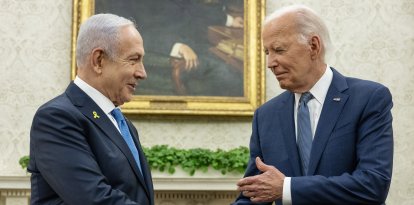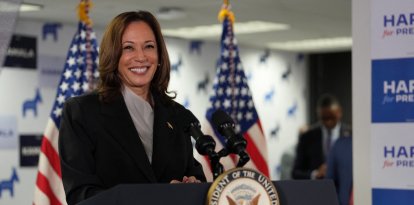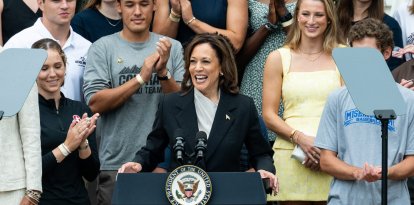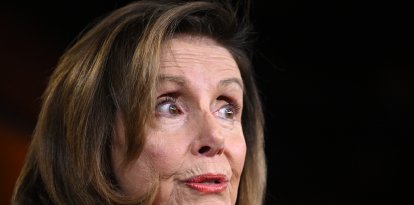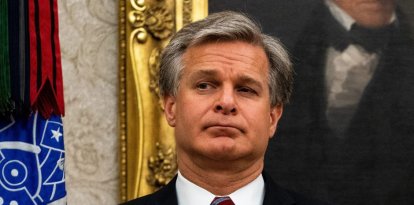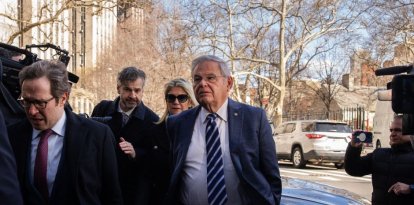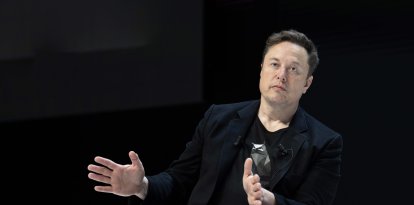Who is Tim Scott? Speaker of a hopeful rhetoric who could be Trump's choice for vice president
The South Carolina senator backed his initial candidacy on restoring "faith in America" and is now among the top names to join Trump in 2024. Here's his story.
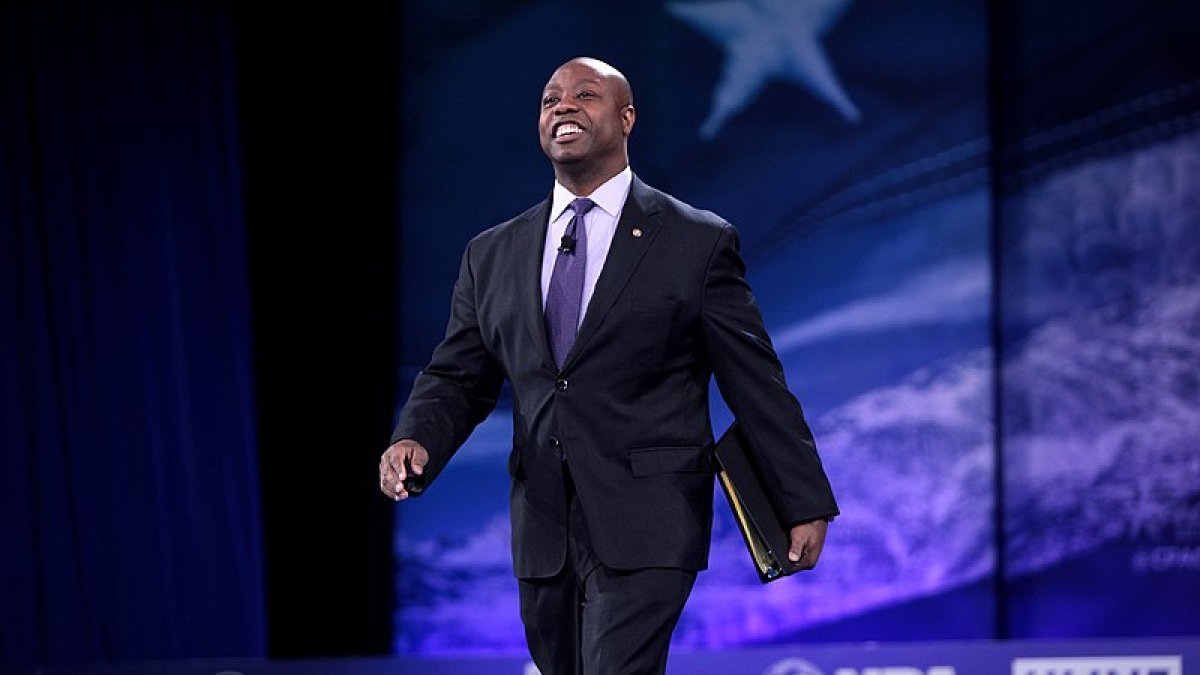
Tim Scott/Wikimedia Commons
Tim Scott tends to lean heavily on his life story, perhaps because it is worth telling. A descendant of slaves, his family went from picking cotton to Congress, all in one generation. He is the first African-American to serve in both chambers, and his rhetoric has nothing to do with victimhood; it's actually quite the opposite. After an unsuccessful presidential run, he is among Donald Trump's choices to be his running mate.
The South Carolina senator dropped his candidacy in November 2023 and formalized his endorsement of the former president in January, highlighting the achievements of his first term and confidence in his ability to defeat Joe Biden in November 2024.
His name began to circulate very strongly on social media after Fox News' Town Hall with Trump, where the former president confirmed that Scott is among his narrowed choices for vice president. For this reason, many have wondered: who is Tim Scott?
From cotton to Congress
Scott was born on September 19, 1957. He grew up in a low-income family, and his parents divorced when he was seven years old. His father was a Vietnam veteran in the Air Force, while his mother was a nurse who often worked double shifts to support her family. After the separation, he moved in with her mother and older brother at his grandfather's house, where they all shared a room. According to him, he was one of the greatest inspirations in his life.
His grandfather dropped out of school in third grade to pick cotton, a job that earned him 50 cents a day. Although he could neither read nor write, he always had a newspaper in his hand. He enjoyed watching wrestling with his grandson, and his favorite person was Bobo Brasil. "His success helped us to see that we could do more. We could be more," Scott recalled years later.
Academically speaking, the current senator was not exactly brilliant. In his first year in high school at RB Stall in North Charleston, he failed Spanish, English, world geography and civics. "Trust me, after spending seven years in the Senate, I know I'm not the only one in Congress who failed civics," he joked at the 2020 Republican National Convention.
His mother forced him to attend summer school, which Scott had to pay for with his first job at a local movie theater. There, in addition to popping popcorn, he met a person who would change his life, John Moniz.
The man imparted "conservative business principles" to him, making him understand that he "could think my way out of poverty."
Scott earned a partial athletic scholarship to Presbyterian College, where he became attached to the teachings of Jesus. "In college, Jesus became everything to me," he wrote in his 2020 book Opportunity Knocks. He graduated in 1988 from the now Charleston Southern University with a bachelor's degree in political science.
After college, he applied Moniz's teachings and became a successful insurance salesman with around 3,000 clients. He entered politics in 1994, when he was elected to the Charleston County Council, making history as the first black Republican elected to any office in South Carolina since the late 19th century.
He held that position until 2009, briefly passing through the state legislature. A year later, he launched an unlikely campaign for the House of Representatives that pitted him against a historic statewide surname. He defeated Paul Thurmond (son of the former senator) in the primaries and then won the general election.
"Because of the evolution of the heart, in an overwhelmingly white district... the voters judged me on the content of my character, not the color of my skin," he celebrated at the time.
A fun fact is that he took his grandfather to vote for the 2008 presidential election, and since he could not read the ballot, he pointed out the name of the person he wanted to elect, Barack Obama. "Timmy, the miracle is not whether I win or not. The miracle is that I'm on the ballot. Timmy, for more than half my life they wouldn't let me vote," he told him emotionally, as recounted in his latest book, "America, a Redemption Story."
Staying on Capitol Hill
He served on the Transportation and Small Business committees while declining to join the Congressional Black Caucus. He justified himself by stating that his campaign "was never about race."
His time there was fairly brief because South Carolina Governor Nikki Haley appointed him in 2012 to replace Jim DeMint in the Senate. He won his seat in 2014 and was reelected in 2016 and 2022.
During his time in the Upper House, he advocated for lowering taxes, protecting the Second Amendment and guaranteeing school choice. However, he prides himself mainly on Opportunity Zones, an investment program he managed to include in the Jobs and Tax Cut Act, enacted by President Trump in 2017.
This allows certain investments made in low-income areas to obtain tax advantages, creating incentives for companies to generate jobs in low-income areas. As of April 2018, there were more than 8,768 zones in all 50 states, which resulted in $75 billion in private investments for these communities.
Scott also cites the First Step Act as one of his legislative accomplishments. This bipartisan criminal justice reform reduced unnecessarily long federal sentences, improved prison conditions, and allowed judges to impose sentences below the statutory minimum in some cases. It was approved with bipartisan support in the House and Senate.
Rhetoric and race
Scott is the first African-American to serve in both Houses of Congress and is known for his hopeful rhetoric. Although he does not deny the past of the United States, he assures that, today, the country "is not racist" and that his story would not have been possible in any other country in the world.
He is a Dallas Cowboys fan and against victimization and has a positive outlook on the future of racial tensions in the United States.
"There are two ways to view history. One is to shine an unwavering light on the myriad atrocities that have befallen us. And there is nothing wrong with having a realistic and honest accounting of history. In fact, it's vital that we do so. It helps us to keep from repeating it. From my experience, however, dwelling on the pain of the past for too long threatens to keep us mired there. When I look back, I prefer to focus on how far we've come. Only then can I envision how beautiful the road ahead could be," he wrote in "America, a Redemption Story," an autobiography that hinted that he would run in the 2024 presidential election.
Candidacy for president
Despite being seen by some as the ideal running mate, Scott made his candidacy for president official on Monday, May 22, at a major event in his home state. With his mother present, he focused on the bounties of the United States, or, as he called it, the "opportunity land."
His speech received an unexpected retweet from Elon Musk, who seemed to celebrate his candidacy with a post on Twitter.
"They are attacking our American values, our schools, our economy, our security… but not on my watch. I cannot stand by while this is done to America. She's done too much for me. Our nation, our values and our people are strong, but our president is weak," Scott told his supporters, despite a slight microphone problem.
His candidacy was endorsed by high-profile senators and former senators such as John Thune (R-SD), Richard Burr (R-NC), Mike Rounds (R-SD) and Cordy Gardner (R-CO), as well as former governors Bill Haslam (R-TN) and Mark Sanford (R-SC).
He also received donations from major businessmen such as Nelson Peltz, Jeffrey Yass and Stanley Druckenmiller.
However, the initial enthusiasm failed to translate into voting intentions, as his sweetening rhetoric did not match what Republicans were looking for. While he came in fourth in the national polls, his participation in the debates disappointed somewhat and was the beginning of the end for his candidacy. Scott failed to transpose his charisma and oratory to the stage and ended up being overshadowed by his competitors.
The senator even surprised members of his campaign on November 3, 2023, when he decided to suspend his run for the White House. "I love America more today than I did on May 22. But when I go back to Iowa, it will not be as a presidential candidate. I think the voters, who are the most remarkable people on the planet, have been really clear that they're telling me: 'Not now, Tim,'" he declared, leaving the door open for a future candidacy.
Endorsement of Donald Trump
Days before the New Hampshire primary, the senator publicly announced his endorsement of Donald Trump's candidacy, whom he joined at a campaign event to confirm the alliance.
"We need a president who will close our southern border today. We need Donald Trump. We need a president who will unite our country. We need Donald Trump. We need a president who will protect your Social Security and my momma's Social Security", he declared at the event, repeating the former president's name several times.
Scott for vice president?
Trump recently participated in a Fox News Town Hall, where he confirmed that the senator's name was more than under consideration.
Laura Ingraham asked the former president about his choice for vice president. She even went further and named the following choices for him: Ron DeSantis, Tim Scott, Vivek Ramaswamy, Byron Donalds, Kristi Noem and Tulsi Gabbard.
The former president confirmed that all of them are on his short list and remarked that he would choose someone with common sense.
"Honestly, all of those people are good. They're all good, they're all solid. And I always say, I want people with common sense because there's so many things happening in this country that don't make sense," he said.













